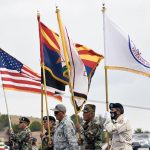
Navajo-Hopi Land Commission steps into livestock fray
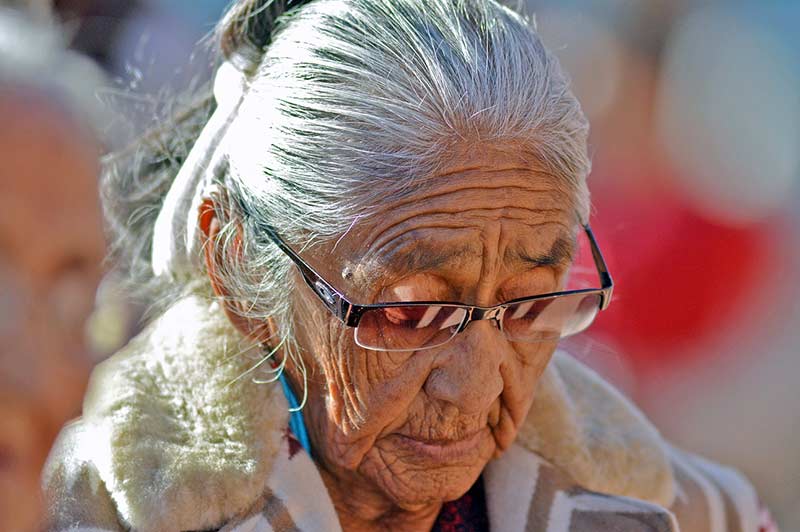
At a protest march in Window Rock Thursday, Caroline M. Tohonnie, 84, of Red Lake, Ariz., speaks about what heavily armed Hopi tribal officers and B.I.A. officers did when they took her sheep from her home. “I went to get hay. When I returned home, I saw them with their guns. Despite that I walked passed them,” Tohonnie said in Navajo to members of the Navajo-Hopi Commission. “We are not rich. Now the Hopis took them from us. Sheep is our life. What are going to do to help us?” (Times photo – Donovan Quintero)
ABOVE: At a protest march in Window Rock Thursday, Caroline M. Tohonnie, 84, of Red Lake, Ariz., speaks about what heavily armed Hopi tribal officers and B.I.A. officers did when they took her sheep from her home. “I went to get hay. When I returned home, I saw them with their guns. Despite that I walked passed them,” Tohonnie said in Navajo to members of the Navajo-Hopi Commission. “We are not rich. Now the Hopis took them from us. Sheep is our life. What are going to do to help us?” (Times photo – Donovan Quintero)
WINDOW ROCK
Seeing her sheep and goats impounded by the Hopi Rangers and Bureau of Indian Affairs and then being warned by them not to come back to her home is the reason Caroline Tohonnie protested in a march Thursday in the tribal capital.

Norman Patrick Brown raises his fist into the air and protests how heavily armed Hopi and BIA SWAT teams confiscated sheep in the Hopi Partitioned Lands. (Times photo – Donovan Quintero)
Tohonnie was among other elderly, including Rena Babbit Lane, and impacted Navajo citizens living on Hopi Partitioned Lands to testify in front of the Navajo-Hopi Land Commission about how they’re being inhumanely treated by the Hopi tribe and BIA. These HPL Navajos, along with several environmental grassroots organizations, peacefully marched from Wells Fargo Bank in Window Rock to the Navajo Nation Council to ask their government and tribal leaders for help.
“I’m wondering what to do,” said the 84-year old Tohonnie, pleading with the commissioners to assist her and others who face the same plight.
Council delegates Elmer Begay (Dilcon, Indian Wells, Teesto, Whitecone, Greasewood Springs), Lorenzo Curley (Klagetoh, Wide Ruins, Houck, Lupton, Nahata Dziil), Walter Phelps (Cameron, Coalmine Canyon, Birdsprings, Leupp, Tolani Lake), Duane Tsingine (Coppermine, K’aibii’to, LeChee, Tonalea/Red Lake, Bodaway/Gap) and Dwight Witherspoon (Hard Rock, Forest Lake, Pinon, Black Mesa, Whippoorwill) were the only delegates present of the eight-member commission, and were the legislators at hand listening to the concerns of these often-neglected constituents.
In her testimony, Tohonnie had explained that the day she had her flock impounded she was about to purchase feed for them at the store, but didn’t because her daughter had contacted her about how the Hopis had come. She raced home from the store and was barricaded from her property by force, which made the confiscation of her sheep easier for the Hopi and BIA officials, she said.
“They said the reason for doing this is because of the law,” Tohannie said, noting that Hopi officials told her she didn’t have the proper documentation for grazing. “We were told we never signed and that there was nothing else to do.”
According to the latest count, the Hopi government and BIA have impounded more than 150 sheep and goats while allegedly using paramilitary tactics, and are conducting these livestock raids without the consultation of the Navajo Nation. There are also reports of drones and helicopters being used to assess the area of the families living on HPL.
Some individuals have been arrested for objecting to the confiscation of their livestock, saying that the last time they were ever notified of a tally count being enforced by the Hopis was back in 2000.
The Hopis, said Raymond Max, executive director for the Navajo-Hopi Land Commission Office, have grazing authority over the permits issued to the Navajo families living on the Hopi Partitioned Lands, according to the Accommodation Agreement under the Navajo-Hopi Land Settlement Act.
Max reported to the commission he had written an Oct. 24 memo to Hopi Chairman Herman Honanie requesting a 10-day grace period to allow the opportunity to confer with residents to request removal of excess livestock from HPL.
Thomas Benally, deputy director for Navajo-Hopi Land Commission Office, said that it’s difficult for Navajo families to reduce their livestock with the Hopi regulations because of two reasons: the Navajo Rangers refuse to help these Navajos because they claim to have no jurisdiction over them living on their ancestral lands leased by the Hopi government, and that the Hopi Rangers refuse to conduct inspections, essentially preventing these families from selling their animals to maintain the proper tally count.
As a result of not knowing when these surprise raids will occur, Colleen Biakeddy and Beulah Blackrock reported that their parents – Ruby Biakeddy and Clarence and Marylou Blackrock – live in fear.
Colleen Biakeddy reported that she and her mother, Ruby, listed 17 instances that outline denials and unethical conduct by the Hopi and BIA officials during the raids.
When her mother had her flock loaded into a trailer, Colleen Biakeddy said that they family was having a ceremony and that Hopi authorities stopped family members in prayer. They were also denied access to check on their animals as well as information and transcripts regarding Accommodation Agreement signers, and were twice declined a health certificate to transport their animals.
Since retrieving their animals from the Hopis, Biakeddy said they were transported across state lines to Aztec, N.M. She did, however, say that the 15 or so sheep would be transported back onto an outfit in Dilkon, Ariz., and eventually off the reservation where the family plans to create a private ranching business.
“We want an investigation,” Biakeddy told the commission. “I want documents of what we did wrong.”
Beulah Blackrock added that the Hopi and BIA officials refuse to talk to any members of a family that doesn’t have a grazing permit. She also said the people from Big Mountain are also ready to protect themselves if nothing can be done.
“This isn’t America,” Blackrock said about what her and her kinfolk are experiencing. “We are entitled to the land, at least to visit, and not be labeled as a trespasser.”
Both women stated that they are talking not only for their immediate family members, but others as well, like Etta Begay, who had her sheep confiscated. Begay will need to pay $2,640 by today to get her livestock back. If she doesn’t get them out by then the Hopi Rangers will add an additional $500, with fees being added the longer her animas are impound.
Currently, Begay has $370 to her name and is seeking assistance from the Navajo Nation and anyone else to get her flock from the Hopis.
Navajo Nation President Ben Shelly, who came by the Council Chamber and heard the cries of these constituents, said that he would begin working the Hopi government and Navajo Division of Public Safety to enter an agreement to where law enforcers would specifically protect the rights of the HPL Navajos.
Shelly added that he was visiting Washington D.C. in the next few days, and he would talk with Congressional leaders there about the plight of the Navajos living on HPL and also get after the BIA for allowing such raids.
“We don’t want to get in any confrontation with the Hopis unless we have facts,” Shelly said.

In Window Rock Thursday, Norman Patrick Brown raises his fist into the air as he marches in protest of how heavily armed Hopi tribal and BIA SWAT teams confiscated sheep from elderly grandmothers and grandfathers in the Hopi Partitioned Lands. (Times photo – Donovan Quintero)
Shelly vowed to phone Honanie after he left the Council Chamber in an effort to stop the raids.
After the reports provided by the impacted families, the commissioners voted to go into executive session to discuss legal options with the Navajo Department of Justice.
Prior to being in executive session, Navajo Nation Attorney General Harrison Tsosie informed the families that he would travel to Hopi on Friday, and begin conversing with the respective leaders in charge of the impoundments.
Tsosie said he would examine the laws of the Navajo-Hopi Land Settlement Act, specifically the Accommodation Agreement, which allows Navajos who chose not to relocate to live on their ancestral lands that are under the jurisdiction of the Hopi tribe.
“Our job is to research this and figure out how to resolve this,” Tsosie said, explaining that he will examine the extent to which the Accommodation Agreement has been violated.
A resolution passed by the commission on Oct. 9 requests the Hopi tribe to live up to the Accommodation Agreement by increasing sheep units up to 2,800 for Navajo families in HPL and allow for grazing in additional range units.
The resolution also calls for the Hopi Tribe to accommodate livestock capacity for Navajo families living in the HPL.
Witherspoon, who called for the special meeting, said the next steps are to begin talking with the Hopis to allow the body, Shelly, Department of Justice and Council to work with the impacted Navajo citizens.
Following their meeting, which was dissolved because of lack of quorum, Shelly and Speaker Pro Tem Lorenzo Bates issued a joint press release demanding the Hopi tribe and BIA stop their raids on Hopi Partitioned Lands.
Bates and Shelly, according to the news lease, request Chairman Honanie to meet with them on Nov. 3 to discuss the ongoing livestock round-ups.
“Among many families, livestock is the main source of food,” Shelly said. “Resolve is all we want.”
Bates added, “Impounding livestock of Navajo people is a deliberation violation of their rights to practice our culture and traditions and it must stop immediately.”

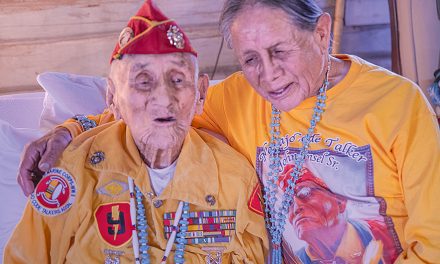
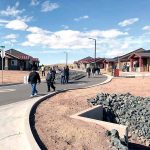
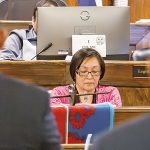




 Highway 264,
Highway 264, I-40, WB @ Winslow
I-40, WB @ Winslow